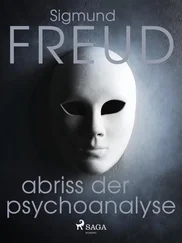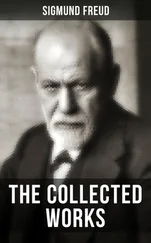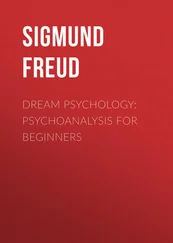The manifold problems of consciousness in their entirety can be examined only through an analysis of the hysterical mental process. From this analysis we receive the impression that the transition from the foreconscious to the occupation of consciousness is also connected with a censorship similar to the one between the Unc. and the Forec. This censorship, too, begins to act only with the reaching of a certain quantitative degree, so that few intense thought formations escape it. Every possible case of detention from consciousness, as well as of penetration to consciousness, under restriction is found included within the picture of the psychoneurotic phenomena; every case points to the intimate and twofold connection between the censor and consciousness. I shall conclude these psychological discussions with the report of two such occurrences.
On the occasion of a consultation a few years ago the subject was an intelligent and innocent–looking girl. Her attire was strange; whereas a woman's garb is usually groomed to the last fold, she had one of her stockings hanging down and two of her waist buttons opened. She complained of pains in one of her legs, and exposed her leg unrequested. Her chief complaint, however, was in her own words as follows: She had a feeling in her body as if something was stuck into it which moved to and fro and made her tremble through and through. This sometimes made her whole body stiff. On hearing this, my colleague in consultation looked at me; the complaint was quite plain to him. To both of us it seemed peculiar that the patient's mother thought nothing of the matter; of course she herself must have been repeatedly in the situation described by her child. As for the girl, she had no idea of the import of her words or she would never have allowed them to pass her lips. Here the censor had been deceived so successfully that under the mask of an innocent complaint a phantasy was admitted to consciousness which otherwise would have remained in the foreconscious.
Another example: I began the psychoanalytic treatment of a boy of fourteen years who was suffering from tic convulsif , hysterical vomiting, headache, etc., by assuring him that, after closing his eyes, he would see pictures or have ideas, which I requested him to communicate to me. He answered by describing pictures. The last impression he had received before coming to me was visually revived in his memory. He had played a game of checkers with his uncle, and now saw the checkerboard before him. He commented on various positions that were favorable or unfavorable, on moves that were not safe to make. He then saw a dagger lying on the checker–board, an object belonging to his father, but transferred to the checker–board by his phantasy. Then a sickle was lying on the board; next a scythe was added; and, finally, he beheld the likeness of an old peasant mowing the grass in front of the boy's distant parental home. A few days later I discovered the meaning of this series of pictures. Disagreeable family relations had made the boy nervous. It was the case of a strict and crabbed father who lived unhappily with his mother, and whose educational methods consisted in threats; of the separation of his father from his tender and delicate mother, and the remarrying of his father, who one day brought home a young woman as his new mamma. The illness of the fourteen–year–old boy broke out a few days later. It was the suppressed anger against his father that had composed these pictures into intelligible allusions. The material was furnished by a reminiscence from mythology, The sickle was the one with which Zeus castrated his father; the scythe and the likeness of the peasant represented Kronos, the violent old man who eats his children and upon whom Zeus wreaks vengeance in so unfilial a manner. The marriage of the father gave the boy an opportunity to return the reproaches and threats of his father—which had previously been made because the child played with his genitals (the checkerboard; the prohibitive moves; the dagger with which a person may be killed). We have here long repressed memories and their unconscious remnants which, under the guise of senseless pictures have slipped into consciousness by devious paths left open to them.
I should then expect to find the theoretical value of the study of dreams in its contribution to psychological knowledge and in its preparation for an understanding of neuroses. Who can foresee the importance of a thorough knowledge of the structure and activities of the psychic apparatus when even our present state of knowledge produces a happy therapeutic influence in the curable forms of the psychoneuroses? What about the practical value of such study some one may ask, for psychic knowledge and for the discovering of the secret peculiarities of individual character? Have not the unconscious feelings revealed by the dream the value of real forces in the psychic life? Should we take lightly the ethical significance of the suppressed wishes which, as they now create dreams, may some day create other things?
I do not feel justified in answering these questions. I have not thought further upon this side of the dream problem. I believe, however, that at all events the Roman Emperor was in the wrong who ordered one of his subjects executed because the latter dreamt that he had killed the Emperor. He should first have endeavored to discover the significance of the dream; most probably it was not what it seemed to be. And even if a dream of different content had the significance of this offense against majesty, it would still have been in place to remember the words of Plato, that the virtuous man contents himself with dreaming that which the wicked man does in actual life. I am therefore of the opinion that it is best to accord freedom to dreams. Whether any reality is to be attributed to the unconscious wishes, and in what sense, I am not prepared to say offhand. Reality must naturally be denied to all transition—and intermediate thoughts. If we had before us the unconscious wishes, brought to their last and truest expression, we should still do well to remember that more than one single form of existence must be ascribed to the psychic reality. Action and the conscious expression of thought mostly suffice for the practical need of judging a man's character. Action, above all, merits to be placed in the first rank; for many of the impulses penetrating consciousness are neutralized by real forces of the psychic life before they are converted into action; indeed, the reason why they frequently do not encounter any psychic obstacle on their way is because the unconscious is certain of their meeting with resistances later. In any case it is instructive to become familiar with the much raked–up soil from which our virtues proudly arise. For the complication of human character moving dynamically in all directions very rarely accommodates itself to adjustment through a simple alternative, as our antiquated moral philosophy would have it.
And how about the value of the dream for a knowledge of the future? That, of course, we cannot consider. One feels inclined to substitute: "for a knowledge of the past." For the dream originates from the past in every sense. To be sure the ancient belief that the dream reveals the future is not entirely devoid of truth. By representing to us a wish as fulfilled the dream certainly leads us into the future; but this future, taken by the dreamer as present, has been formed into the likeness of that past by the indestructible wish.
"Ich möchte gerne etwas geniessen ohne 'Kosten' zu haben." A a pun upon the word "kosten," which has two meanings—"taste" and "cost." In "Die Traumdeutung," third edition, p. 71 footnote, Professor Freud remarks that "the finest example of dream interpretation left us by the ancients is based upon a pun" (from "The Interpretation of Dreams," by Artemidorus Daldianus). "Moreover, dreams are so intimately bound up with language that Ferenczi truly points out that every tongue has its own language of dreams. A dream is as a rule untranslatable into other languages."—TRANSLATOR.
Читать дальше












